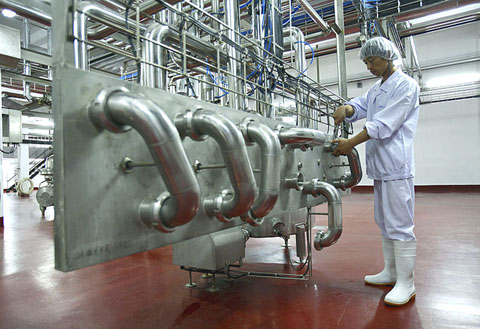The Department of Health (DOH) yesterday announced its initial findings in the ongoing milk powder scare, saying that only one of the 22 Chinese companies suspected of selling contaminated food products had exported goods to Taiwan.
On Tuesday, China’s General Administration of Quality Supervision, Inspection and Quarantine reported that a total of 69 products made by 22 companies, including Sanlu, were contaminated with the toxic chemical melamine.
Hsiao Tung-ming (蕭東銘), acting director of the DOH’s Bureau of Safety, said yesterday that only Sanlu products had been imported.

PHOTO: BLOOMBERG
After a cross-departmental meeting at the Executive Yuan, Hsiao said: “The government has prohibited all imports of dairy products from the 22 companies in China.”
Hsiao was referring to a provisional meeting of Cabinet officials called by Premier Liu Chao-shiuan (劉兆玄) at 9am yesterday morning.
During the meeting, the Cabinet banned the 22 baby milk powder brands from entering Taiwan and demanded that all Chinese dairy products be removed from the market, Executive Yuan spokeswoman Vanessa Shih (史亞平) said.
“The ban prohibiting businesses from putting Chinese dairy products on the market won’t be lifted until importers of the products provide food safety certificates for the products,” Shih said.
Shih also said Liu had told Mainland Affairs Council Chairwoman Lai Shin-yuan (賴幸媛) to prioritize establishing a stricter monitoring system to check the safety of Chinese products during the next round of cross-strait negotiations.
Deputy Health Minister Sung Yen-jen (宋晏仁) said yesterday that 17 companies in Taiwan had imported dairy products from China. The DOH has prohibited sales of these products by all Taiwanese retailers until the companies in question provide documents certifying their products are safe, he said.
“We basically believe that [the products] are not a problem,” Sung said, adding that this measure was just to be on the safe side.
The 17 companies must have their products inspected by the Food Industry Research and Development Institute and obtain documents certifying their safety.
The list of the 17 questionable companies included Nestle, but it was taken off the list when institute findings were reviewed by the DOH yesterday afternoon.
The DOH said it had taken legal action against two companies that refused to cooperate with investigations. Taiway Technology Co still had 221 unaccounted containers of milk powder products, while Wabake had 64.
“Their numbers just don’t match up,” said Hsiao, adding that the DOH had asked the Bureau of Investigation for assistance in this matter.
The Straits Exchange Foundation (SEF) yesterday said it issued a letter to its Chinese counterpart, the Association for Relations Across the Taiwan Strait, asking it to find out if the milk products sold to Taiwan by several Chinese firms between January and July were contaminated with melamine.
The SEF said it hoped ARATS would help uncover the details of the matter.
ADDITIONAL REPORTING BY KO SHU-LING AND SHIH HSIU-CHUAN

‘DANGEROUS GAME’: Legislative Yuan budget cuts have already become a point of discussion for Democrats and Republicans in Washington, Elbridge Colby said Taiwan’s fall to China “would be a disaster for American interests” and Taipei must raise defense spending to deter Beijing, US President Donald Trump’s pick to lead Pentagon policy, Elbridge Colby, said on Tuesday during his US Senate confirmation hearing. The nominee for US undersecretary of defense for policy told the Armed Services Committee that Washington needs to motivate Taiwan to avoid a conflict with China and that he is “profoundly disturbed” about its perceived reluctance to raise defense spending closer to 10 percent of GDP. Colby, a China hawk who also served in the Pentagon in Trump’s first team,

SEPARATE: The MAC rebutted Beijing’s claim that Taiwan is China’s province, asserting that UN Resolution 2758 neither mentions Taiwan nor grants the PRC authority over it The “status quo” of democratic Taiwan and autocratic China not belonging to each other has long been recognized by the international community, the Mainland Affairs Council (MAC) said yesterday in its rebuttal of Beijing’s claim that Taiwan can only be represented in the UN as “Taiwan, Province of China.” Chinese Minister of Foreign Affairs Wang Yi (王毅) yesterday at a news conference of the third session at the 14th National People’s Congress said that Taiwan can only be referred to as “Taiwan, Province of China” at the UN. Taiwan is an inseparable part of Chinese territory, which is not only history but

CROSSED A LINE: While entertainers working in China have made pro-China statements before, this time it seriously affected the nation’s security and interests, a source said The Mainland Affairs Council (MAC) late on Saturday night condemned the comments of Taiwanese entertainers who reposted Chinese statements denigrating Taiwan’s sovereignty. The nation’s cross-strait affairs authority issued the statement after several Taiwanese entertainers, including Patty Hou (侯佩岑), Ouyang Nana (歐陽娜娜) and Michelle Chen (陳妍希), on Friday and Saturday shared on their respective Sina Weibo (微博) accounts a post by state broadcaster China Central Television. The post showed an image of a map of Taiwan along with the five stars of the Chinese flag, and the message: “Taiwan is never a country. It never was and never will be.” The post followed remarks

INVESTMENT WATCH: The US activity would not affect the firm’s investment in Taiwan, where 11 production lines would likely be completed this year, C.C. Wei said Investments by Taiwan Semiconductor Manufacturing Co (TSMC, 台積電) in the US should not be a cause for concern, but rather seen as the moment that the company and Taiwan stepped into the global spotlight, President William Lai (賴清德) told a news conference at the Presidential Office in Taipei yesterday alongside TSMC chairman and chief executive officer C.C. Wei (魏哲家). Wei and US President Donald Trump in Washington on Monday announced plans to invest US$100 billion in the US to build three advanced foundries, two packaging plants, and a research and development center, after Trump threatened to slap tariffs on chips made